Primeval and Other Times
Olga Tokarczuk
Translated from the Polish by Antonia Lloyd-Jones
Twisted Spoon Press, Prague 2010
248 pp
Reviewed by Katie Eberhart
This novel begins with the boldly presented idea that Primeval is both a place and more than a place. The first thing we learn is that “Primeval is the place at the centre of the universe” and I reminded myself of Primeval's exceptional location as I followed the intergenerational tableau anchored within a normal-seeming landscape in Poland of roads and forests, farms, rivers and lakes but along the borders four archangels are said to protect against certain human shortcomings.
In Primeval and Other Times each chapter or section begins “The Time of . . .” and the novel unfolds as separate but interlaced stories where characters appear, and reappear, sometimes in their own story and sometimes in another character's story. Many characters are related to other characters by family, or accidental encounter, dreams or beliefs, and the characters are staunch in what they believe, whether it is a higher power, believing that the midwife switched the babies at birth, or a game that becomes an obsession.
Written in a straightforward prose, the stories span human actions and reactions, showing the inner workings of a community, the interactions between people, causes and effects, and beliefs and desires. For instance, “The Time of Genowefa” begins in 1914 when Genowefa's husband Michał is suddenly taken away to fight in the Russian army. Misia is born while her father, Michał, is away at the war. (Misia is an adult with her own children when Primeval becomes the front during the Second World War.) As a child, Misia watched her father returning: “[her] first memory was the sight of the ragged man on the road to the mill. Her father staggered as he walked, and then often cried at night, . . .” and her father brought the grinder home from the war:
Misia's grinder came into being because of someone's hands combining wood, china and brass into a single object. The wood, china and brass made the idea of grinding materialize. Grinding coffee beans to pour boiling water on them afterwards. There is no one of whom it could be said that he invented the grinder, because creating is merely reminding yourself of what exists beyond time, in other words, since time began. Man is incapable of creating out of nothing – that is a divine skill. (44-45)The grinder is not quite a talisman but one of its roles is to mark time because it is something which barely changes while people grow and age, wars are fought, and a lot happens. The grinder signifies endurance and continuity, much like the grist mill which, in a larger sense, anchors Primeval to the very basis of survival. But it isn't just things that have a symbolic nature, characters also achieve a larger more representative role, such as Misia:
Like every person, Misia was born broken into pieces, incomplete, in bits. Everything in her was separate – looking, hearing, understanding, feeling, sensing, and experiencing. Misia's entire future life would depend on putting it all together into a single whole, and then letting it fall apart. (42)I was intrigued by the transformation of characters and indeed what might change a character's life, and thus story, such as Florentynka who is an old woman living alone with her dogs and the explanation of her circumstances becomes part of the myth-making effect:
People think madness is caused by a great, dramatic event, some sort of suffering that is unbearable. They imagine you go mad for some reason. . . People also think madness strikes suddenly, all at once, in unusual circumstances, and that insanity falls on a person like a net, fettering the mind and muddling the emotions.Tokarczuk has tackled a difficult task, to create a place, characters, and stories that exist in their own right but also within the stream of history, where the characters are both believable and beyond belief, where the extremes are pushed farther than what most of us have experienced and yet (the terrifying part) are anchored in twentieth century history. One result is questions like How can this be? How could this happen? which are the troubling questions about the times during which events in Primeval occurred.
But Florentynka had gone mad in the normal course of things, you could say for no reason at all. . . . (52-53)
Offsetting all of the changes though is a constancy—of space and time—so that the mill on the river continues to exist, whether there is grain or not, and also
There are lime trees lining the Highway leading from Jeszkotle to the Kielce road. They looked the same at the beginning, and they will look the same at the end. They have thick trunks and roots that reach deep into the earth, where they meet the foundations of everything that lives. . . . (188)Primeval and Other Times is a carefully wrought fictional exploration of the light and dark elements of being. Tokarczuk's strong voice and meticulous writing have brought these stories into existence making Primeval its own place with a compelling intergenerational drama that is set within the context of a history we know. Olga Tokarczuk's novel tells important stories that will be of interest to anyone who is a student of human nature and history and who has ever wondered how mythologies develop; and Primeval and Other Times should be read by everyone because literature is one way we remember and learn from the past.
* * *
Katie Eberhart's writing and poems exploring the fine margin between people and landscape can be found in the Palmer (Alaska) Arts Council poetry anthology Voices Between Mountains and the online literary journal Plasma Magazine. Katie was selected as an Artsmith Artist Resident in 2009 and has an MFA in Creative Writing from the Rainier Writing Workshop.





